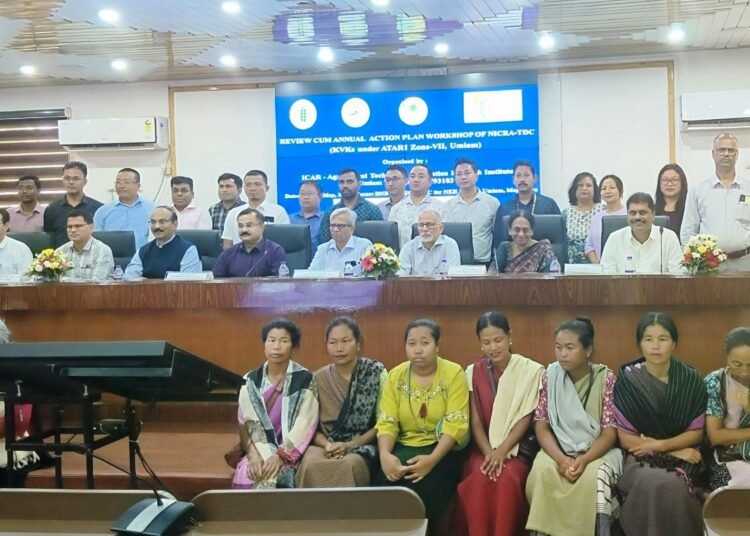Fifteen Krishi Vigyan Kendras under ICAR-ATARI, Umiam got together for a two-day annual review cum action plan workshop, which concluded today.
The workshop delved into the scientific review of the progress of work conducted during 2023-24 and culminated with the formulation of a suitable action plan based on agro-climate oriented prevalent climatic aberrations, technological adaptations dealing with the key areas of climate change, their adaptation and mitigation.
Scientists / Head of KVKs across five Northeastern states of Manipur, Meghalaya, Mizoram, Nagaland and Tripura along with scientists of various research institutes ICAR RC NEH, Umiam; ICAR-CRIDA, Hyderabad and ICAR-ATARI, Umiam took part in the programme.
Former Secretary, DARE and Director General ICAR, Prof. Panjab Singh inaugurated the event. During his speech, he highlighted the significance of resource conservation and resource use efficient technologies for prioritising the climate resilient technologies for NICRA technology demonstration in order to bring an ecological balance and environmental sustainability.
Former DDG (NRM), ICAR-New Delhi, Dr. A.K Singh spelt out the importance of IFS models, which is considered as the most effective climate resilient technology suitable for the region. He also gave a brief overview of Green Credit programs to save natural resources and advised for collaboration with FPOs and SHGs for dissemination of successful technologies. In addition, he also advised to take up an impact study of NICRA-TD component.
Director, ICAR-ATARI, Umiam Dr. A.K Mohanty in his address focused upon selection of appropriate innovative climate resilient technologies developed by research institutes matching to the needs of farmers and stressed upon the sustainability of climate resilient technologies giving emphasis on applicability, affordability and acceptability (3A) of technologies by establishing a model of public-private-producer partnership (4P). He accentuated the importance of technology led agri-entrepreneurship based on i3 model i.e. Information, Innovation and Incubation to scale up the climate resilient interventions.
Director, ICAR-CRIDA, Hyderabad Dr. V. K Singh cited the precarious situation of climate change in the region during the last 15 years with rise of 0.20C temperature per annum and deficit of around 8 per cent in total rainfall, the region is very much sensitive to climate change and suggested for sustainable adoption of technologies.
Principal Scientist (AE), SMD (Ext.) ICAR Dr. Sujeet Kumar Jha appreciated the efforts of the scientists involved in NICRA project component for bringing out promising climate resilient technologies in the context of global warming scenario. He urged the scientists to promote Natural Farming among NICRA farmers with Low External Inputs for Sustainable Agriculture (LESA).
Former DOR, CAU, Imphal and Chairman, ZMC NICRA Dr. CA Srinivasamurthy gave an overview of the climatic aberrations seen in the region that affects farming, livestock as well as forest resources. He highlighted the extensive use of local resources and other natural resources which have a good effect on soil and microbial health.
Various publications like NICRA annual report, annual action plan-2023 and folders were released during the session.
VCRMC President of Thadnongiaw village under Bhoirymbong block, Plenty Makri was felicitated for her significant contribution for successful implementation of NICRA interventions in her village.
A total of 15 KVKs presented their report for 2023-24 and annual action plan for 2024-25 which was thoroughly reviewed by the expert panel.






























